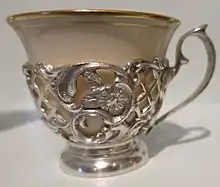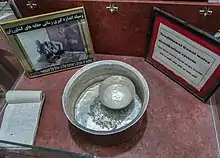پنگان
See also: پنكان
Ottoman Turkish

پنگان

پنگان

پنگان
Alternative forms
- پنكان (pinkân)
Pronunciation
- IPA(key): /pinˈɟɑn/
Noun
پنگان • (pingân)
- cup, bowl
- cupping jar
- water clock, clepsydra, being a bronze cup with a small hole in the bottom used for measuring time by placing it into water, it filled in 8 2⁄3 seconds, 1⁄10000 of a day
- a measure of time equalling 8 2⁄3 seconds, 1⁄10000 of a day
References
- Kélékian, Diran (1911), “پنگان”, in Dictionnaire turc-français, Constantinople: Mihran, page 325a
- Meyer, Gustav (1892), “Türkische Studien. I. Die griechischen und romanischen Bestandtheile im Wortschatze des Osmanisch-Türkischen”, in Sitzungsberichte der philosophisch-historischen Classe der Kaiserlichen Akademie der Wissenschaften (in German), volume 128, Wien: In Commission bei F. Tempsky, page 51
- Meninski, Franciszek à Mesgnien (1680), “پنگان”, in Thesaurus linguarum orientalium, Turcicae, Arabicae, Persicae, praecipuas earum opes à Turcis peculiariter usurpatas continens, nimirum Lexicon Turkico-Arabico-Persicum, Vienna, column 903
- Zenker, Julius Theodor (1866), “پنگان”, in Türkisch-arabisch-persisches Handwörterbuch, volume 1, Leipzig: Wilhelm Engelmann, page 212
Persian
Etymology
Presumed to be borrowed, alongside Ossetian фынг (fyng), фингӕ (fingæ, “table”)[1], from Ancient Greek πίναξ (pínax), πίνακος (pínakos, “wooden plank, dish, writing table”)[2], possibly via Classical Syriac ܦܝܢܟܐ (pinkā).[3] Perhaps cognate with Sanskrit पिनाक (pínāka, “staff, stick”).[4] Whereas according to Vinson this is all from a compound of Middle Chinese, Mandarin 瓫 (pén, “flat dish”)) and 盎 (àng, “wide-bellied bowl”) (perhaps instead 銀/银 (yín, “silver”), 案 (àn, “desk, table”)?), however not attested, so alternatively he suggests 平安 (píng'ān, “tranquil, safe”) printed onto Chinese household appliances like vases.[5]
Pronunciation
- (Classical Persian) IPA(key): /pinˈɡɑːn/
- (Dari Persian) IPA(key): /pɪnˈɡɑːn/
- (Iranian Persian) IPA(key): /penˈɡɒːn/
- (Tajik) IPA(key): /pinˈɡɔn/
Declension
This noun needs an inflection-table template.
Descendants
- → Arabic: فِنْجَان (finjān) (see there for further descendants)
- → Bikol Central: pinggán
- → Cebuano: pinggan
- → Khumi Chin: pangkae
- → Maguindanao: pinggán / ڤنغن
- → Malagasy: zíngga, zìnga
- → Malay: pinggan / ڤيڠݢن
- Indonesian: pinggan
- → Maranao: pinggan
- → Mapun: pinggán
- → Tagalog: pinggán
- → Tamil: பீங்கான் (pīṅkāṉ)
- → Tausug: pinggan
- → Toba Batak: pinggan
- → Ottoman Turkish: پنگان (pingân), پنكان (pinkân)
- → Waray-Waray: pinggán
References
- Абаев, В. И. (1958–1995) Историко-этимологический словарь осетинского языка [Historical-Etymological Dictionary of the Ossetian Language] (in Russian), Moscow, Leningrad: Academy Press
- Asatrian, Garnik S. (2011), “fenjū”, in A Comparative Vocabulary of Central Iranian Dialects (in Persian and English), Tehran: Safir Ardehal Publications, page 149
- Nöldeke, Theodor (1892) Persische Studien (Sitzungsberichte der Kais. Akademie der Wissenschaften in Wien, Philosophisch-Historische Klasse; 126) (in German), volume II, Vienna, page 38
- Pokorny, Julius (1959) Indogermanisches etymologisches Wörterbuch [Indo-European Etymological Dictionary] (in German), volume 3, Bern, München: Francke Verlag, page 830
- Vinson, Julien (1903) Manuel de la langue tamoule (grammaire, textes, vocabulaire), Paris: Imprimerie Nationale, Ernest Leroux, page 21
This article is issued from Wiktionary. The text is licensed under Creative Commons - Attribution - Sharealike. Additional terms may apply for the media files.